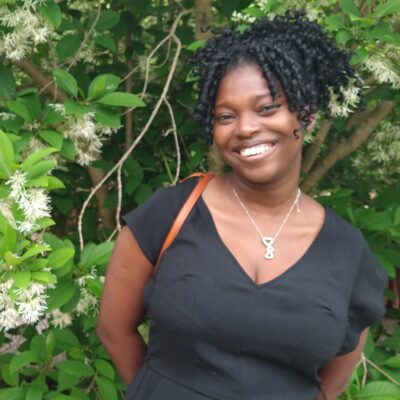Student Spotlight: Ranee Anderson

May 12, 2025
Ranee Anderson is a doctoral candidate in food science and technology from Kingston, Jamaica. She earned her B.Sc. at the University of the West Indies, Mona and now studies diagnostic methods for salmonella under the guidance of Sam Nugen at Cornell.
What is your area of research and why is it important?
Salmonella is a global threat and often infects humans through contaminated food. The current diagnostic methods take too long to detect bacteria, and this can sometimes lead to death. My research focuses on genetically modified bacteriophages (viruses that infect and kill bacteria) to use them as rapid biosensors, so we can detect the presence of salmonella quickly.
What are the larger implications of this research?
There are many large-scale impacts of my work. It can be used to improved food safety. Rapid detection of salmonella can prevent outbreaks, reduce food recalls, and protect consumers from life-threatening illnesses. It can reduce economic burden. Salmonella outbreaks can have devastating economic consequences, particularly for the food industry. This research can help mitigate these losses. It can enhance global health security by providing a rapid and effective detection method. This research can contribute to global efforts to prevent and control infectious diseases. The rapid biosensor technology could be developed into point-of-care diagnostic tools, enabling health care professionals to quickly diagnose and treat infections in resource-limited settings.
You were named second place winner in the 2025 Three Minute Thesis (3MT) competition. Can you describe the process of condensing your research into a three-minute presentation?
To craft a compelling Three Minute Thesis presentation, I distilled my research into a single key takeaway, focusing on its significance and impact. I structured my presentation with a clear introduction, body, and conclusion, incorporating storytelling techniques to engage the audience. Through practice, I refined my delivery, timing, and tone, seeking feedback from friends and family to further improve my presentation. This process allowed me to effectively communicate the essence of my research, ultimately earning me second place in the 2025 Three Minute Thesis competition.
How will you take what you’ve learned from participating in the 3MT and use it in future academic and professional contexts?
Participating in the 3MT competition has been a transformative experience that has taught me the importance of clear, concise, and compelling communication. I plan to apply this skillset in academia by simplifying complex concepts and crafting engaging presentations that capture my audience’s attention. In professional contexts, I’ll utilize my newfound ability to communicate complex scientific concepts to non-technical stakeholders, facilitating effective science communication and collaboration. By being able to clearly articulate my research, I’ll be better equipped to build meaningful partnerships and convey my ideas, ultimately benefiting me throughout my academic and professional journey.
What are your hobbies or interests outside of your research or scholarship?
Outside of my research, I enjoy exploring new places through travel; one of my goals is to see the Seven Wonders of the World. I love doing new craft activities. I’m particularly passionate about woodworking, finding joy in creating something with my own hands. From designing to execution, I love the process of bringing a woodworking project to life. I also appreciate planning and executing trips, attending events, and spending a lot of time with my hamster, Socrates.
Why did you choose Cornell to pursue your degree?
When I was applying for grad school, I spoke to students from all the labs, and I loved how kind and approachable the students in the Nugen lab were. I also loved how they spoke about our advisors and the department.
